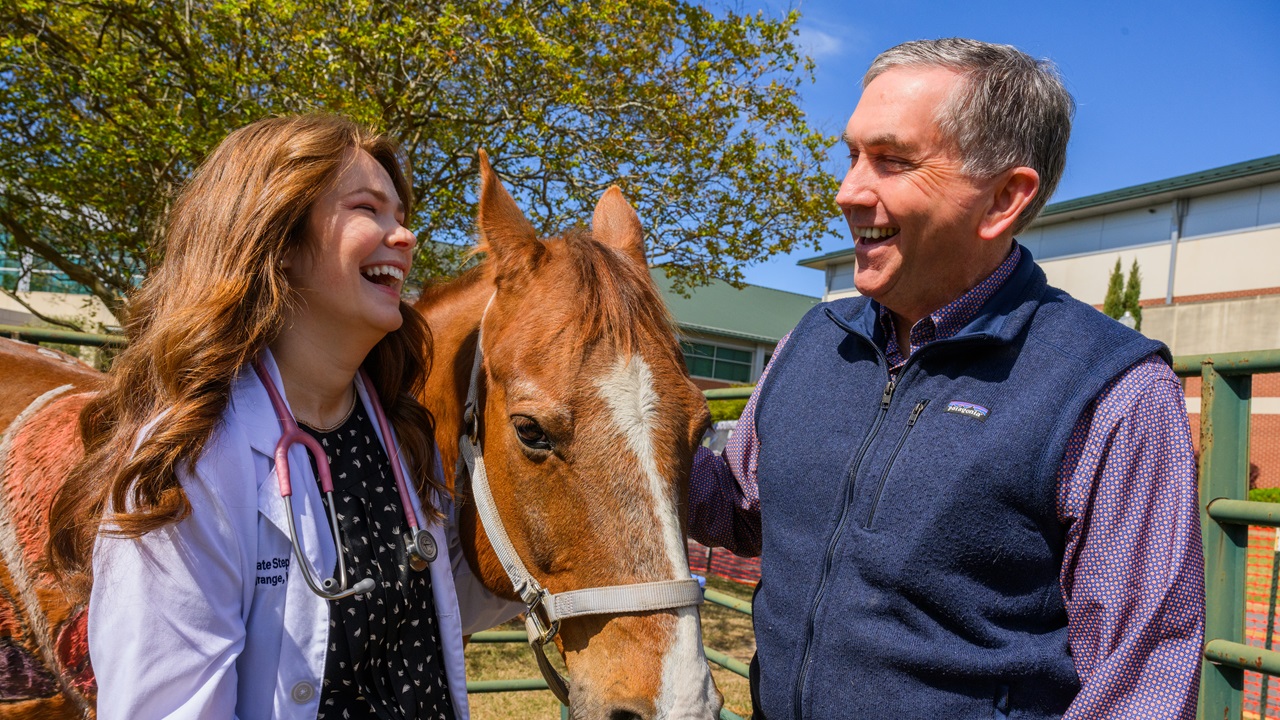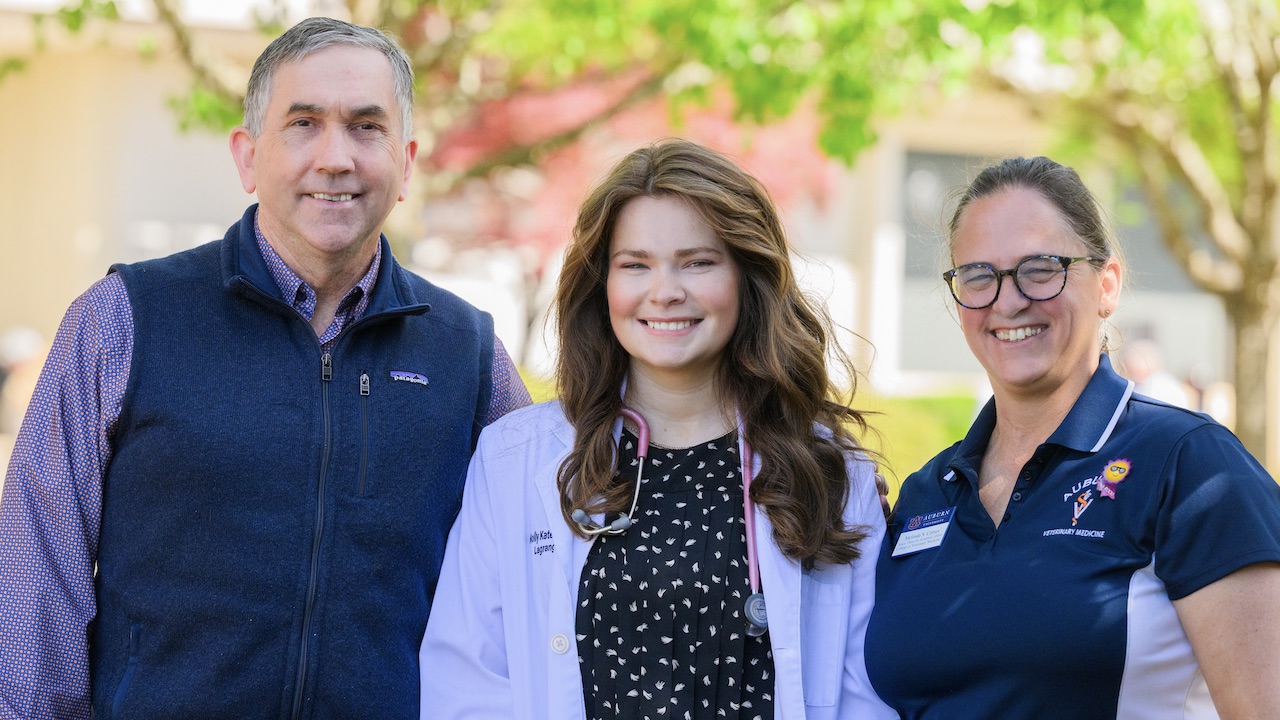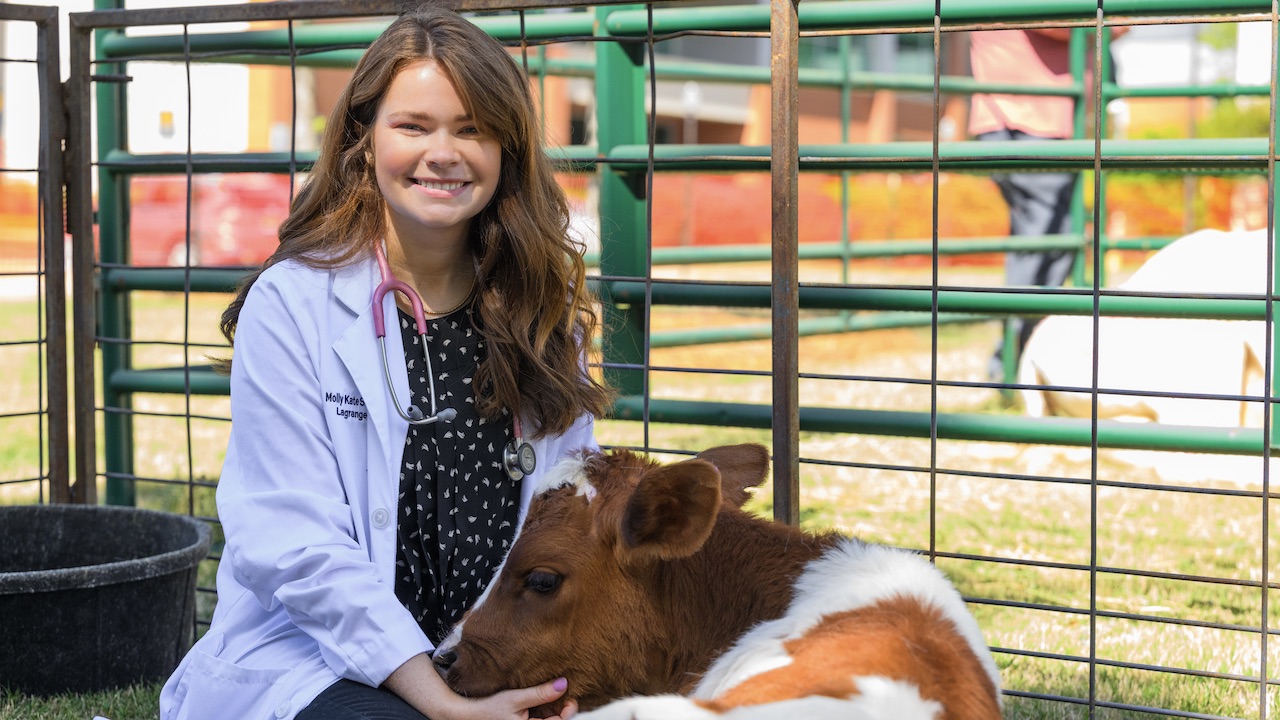content body
Molly Kate Stephens was born and raised in Kentucky, but she has never felt far from home as an Auburn University veterinary student. She’ll soon be joining the ranks of over 2,000 veterinary alumni from Kentucky who have pursued Auburn degrees at in-state rates.
Over the past seven decades, Kentucky has had a contractual agreement with Auburn’s College of Veterinary Medicine (CVM) that essentially makes Auburn its state veterinary college: Auburn reserves 38 seats for Kentucky residents in each of its 130-member veterinary classes, and the commonwealth pays a contracted rate to the Southern Regional Education Board (SREB) that essentially covers the difference between in-state and out-of-state expenses.
“From Auburn’s perspective, it’s a win because we are recovering out-of-state tuition, but the student who’s attending school here pays as if they were an Alabama resident,” said CVM Dean and Professor Calvin Johnson. “And that really adds up: Over the course of a four-year span, they’re saving over $100,000.”
Stephens, the daughter of schoolteachers, attests to the contract program’s value: “Auburn is such a good school, so many people want to go here from out of state,” she said. “Personally, I don’t know if I would’ve been able to pay the out-of-state tuition.”

CVM senior Molly Kate Stephens (left) and Dean Calvin Johnson enjoy a conversation about equine medicine.
Grateful for Auburn’s sense of community
Stephens, who grew up in La Grange, Kentucky, is among 70% of program participants who will return to their home state to practice veterinary medicine. After earning her Doctor of Veterinary Medicine in May, she plans to join Noah’s Ark Animal Clinics and Animal Hospitals in northern Kentucky as a small-animal veterinarian.
Kentucky is a state known for bluegrass pastures, rail fences, picturesque mountains, rivers and plains. While Stephens is eager to return, she’s also quick to add that she’s never felt out of place at Auburn.
“When I went to undergrad at the University of Southern Mississippi, I was the only person from Kentucky there, and I felt very alone. At Auburn, having so many students from Kentucky gives it a sense of community, which is nice when you are away from home,” she said.
Stephens strongly recommends Auburn to students from Kentucky who want to be veterinarians.
“Auburn’s teaching hospital is one of the best veterinary teaching hospitals in the country … and the curriculum is very rigorous,” she said.
Stephens said she appreciates the fact that the CVM “pushed me to the limits.”
“I think that for someone to grow, they need to be pushed out of their comfort zone,” she said. “Because I participated in the contract program, I feel well-prepared for my future as a veterinarian.”
Benefits beyond training tomorrow’s veterinarians
While preparing veterinarians for a successful future is the contract program’s primary goal, it has other benefits, Johnson said. It is, for example, an important way the college demonstrates its commitment to animal health across all sectors of the veterinary profession, ranging from cutting-edge companion animal medicine to equine sports medicine to large animal and mixed practice in underserved rural areas.
“There’s a real concern that there are not enough veterinarians serving each of these important parts of the profession,” Johnson said.
“At Auburn, we believe in a broad-based veterinary education. Each student is equipped to enter most types of practice and to treat nearly all species.”
This approach seems to fit the needs of Kentucky extremely well.

Dean Calvin Johnson (left), CVM senior Molly Kate Stephens (center) and Academic Affairs Associate Dean Melinda Camus participate in the College of Veterinary Medicine’s Vet Fest in April.
Part of Auburn’s legacy of service to the South
Kentucky’s contract with Auburn is a legacy of the university’s service to educate veterinary students in 10 southeastern states. Established in 1892, Auburn was the first veterinary program in the region, and other nearby states have historically sent their students there.
In 1951, then-CVM Dean Redding S. Sugg worked with the SREB, a compact with 16 member states, to develop contracts that would provide seats for students from states without veterinary colleges. Over time, most of the contracts ceased as states established their own veterinary colleges, usually with Auburn’s help.
However, the contract with Kentucky, which doesn’t currently have such a college, persists.
“As we do for Alabama, we pay a lot of attention to Kentucky’s animal health needs,” Johnson said. “Kentucky has a world-renowned equine industry, and we maintain strong equine programs at Auburn.”
“We maintain a very close relationship with the Kentucky Veterinary Medical Association (KVMA), and they are extremely supportive of Auburn’s relationship with Kentucky. The KVMA helped us fundraise to build a new equine barn when the John Thomas Vaughan Large Animal Teaching Hospital was constructed in Auburn.”
CVM faculty members also conduct grant-funded research and outreach programs in Kentucky. Today, most of the veterinarians residing in Kentucky are Auburn alumni, Johnson said, and the CVM maintains strong relationships with the state’s practitioners.
There have been initiatives and discussions about Kentucky starting its own veterinary college, but Johnson believes in the current program.
“From an economic perspective and from a quality of education perspective, it would be extremely difficult for Kentucky to do any better than what they have in their relationship with Auburn,” said Johnson.
“We believe that Kentucky does have a veterinary college, and it just happens to be located in Auburn, Alabama.”





